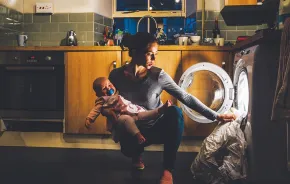 The fact is that we parents aren’t always completely truthful. Sometimes we hold back the truth because the social situation calls for it. Sometimes we “stretch the truth” because doing so avoids an uncomfortable situation, and sometimes we just plain tell stories that aren’t true at all and act like they are.
The fact is that we parents aren’t always completely truthful. Sometimes we hold back the truth because the social situation calls for it. Sometimes we “stretch the truth” because doing so avoids an uncomfortable situation, and sometimes we just plain tell stories that aren’t true at all and act like they are.
Our children aren’t always completely truthful either. Sometimes when children avoid the truth they are just learning about what is appropriate. Sometimes they are protecting themselves and sometimes (especially at young ages) they enjoy the story and want us to enjoy it too.
Social lying
Our children learn from us. They also know we aren’t always telling the truth and gradually they learn that “honesty” can be contextually variable according to the social situation.
Imagine you are standing in the grocery store checkout line and you hear your child announce to the world, “Mommy, you farted.” True. But sheesh, this is one that didn’t need to be publicized, did it?
You are visiting grandparents and your 3-year-old looks your own mother straight in the eye and says, “Grandma, you really have bad breath.”
You are standing in the elevator with your children and a gentleman in the elevator is fingering his cigarettes, obviously anxious to be outside, and your 5-year-old tells him, “You shouldn’t smoke because it really can make you sick.” Also true and maybe out of the mouth of a 5-year-old it sounds different, but you notice that these kinds of truths cross some of our unspoken social boundaries.
Children make all kinds of mistakes as they learn the rules for social lying. Young children are quite truthful and notice the social awkwardness (and perhaps mini-lecture) that follows. They may also be silent when it is appropriate to speak up.
Lying for protection
Children are amazing observers. Have your children ever heard you tell a “white” lie? Perhaps you’ve told a friend that her cooking was wonderful when it was merely okay, or that you weren’t feeling well when you just didn’t feel like spending the evening away from home. I wasn’t aware of the “little” lies I told until I heard one of my children make an excuse to a friend on the phone that clearly was not true. Wake-up call! Where did she learn that?
Sometimes we specifically teach our children to tell a lie. Many parents tell children who are at home alone to tell people on the phone that mom or dad is in the shower instead of at the grocery store for 15 minutes. Not really the truth, is it? How do we teach that some lies are “good” and some are “wrong”?
Children often lie for protection of themselves or other people that they care about. This is especially true when they are afraid of what will happen if they tell the truth. One way to help children through this is to model learning from mistakes and using solutions instead of punishment (consequences).
Fiction as truth
Sometimes we fabricate stories (untruths/lies) and tell them to our children. We tell stories about Santa and the Tooth Fairy when our children are young — giving them the clear impression that something magical really happens — only later to dispel that notion.
Children make up stories too. They want us to enjoy the story as if it were real. Lots of us are uncomfortable with this fuzzy area between fantasy and truth. Underneath we may worry that the child is confusing his or her imagination for the real world. (How different is that from the Santa story?) You can stay in both worlds and celebrate your child’s imagination by saying something like, “I’m really enjoying your story, tell me more.” That way you can jump into story land with your child and establish a subtle but clear understanding that it is a world of your child’s creation.
Growing integrity
In the long run we hope that our children develop a sense of integrity. We hope that they learn to problem-solve, ask for help when they need it and can grow into dependable people who can form trusting relationships. They learn how to do that from us.
There will always be times when it is socially appropriate not to tell the “whole truth” and your children will learn that from you. There will be times when you and your children will join each other in imaginative tales and stories for the magic and joy of it.
In between those times though, we can help our children by growing our own integrity through:
- Acknowledging our mistakes and repairing instead of hiding them.
- Teaching our children how to fix their mistakes instead of making them pay through punishment or consequences.
- Handling conflict and difficult situations as honestly as possible instead of making excuses.
Related article from Sound Discipline:
Why Kids Lie and What to Do About It
 About the author
About the author
Jody McVittie, MD is the executive director and cofounder of Sound Discipline, a local nonprofit dedicated to teaching people to do the right thing, even when no one is looking. Sound Discipline works with schools and families in the Puget Sound Community.












